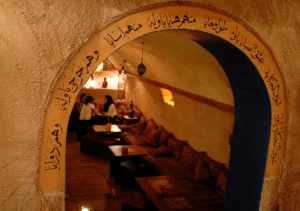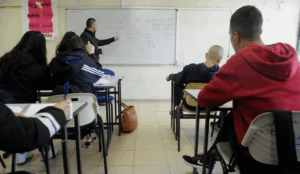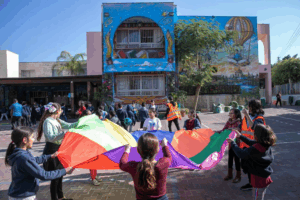‘It’s a form of boycott’: Why these Palestinian citizens of Israel cut Hebrew out of their everyday lives

An archway in Fattoush, a café and bar in Haifa that’s popular among young Palestinian citizens of Israel.
Nagham Zbeedat reports in Haaretz on 18 July 2025:
At a bustling café in Haifa, a group of friends switch effortlessly between Arabic and English – without a word of Hebrew. It’s not that they don’t speak it. In fact, most of them studied it for years and use it fluently in academic or professional settings. But when it comes to casual conversations, many Arabic speakers are now making a deliberate choice: to avoid speaking Hebrew altogether.
Among those making this conscious linguistic shift is Ahlam, a 26-year-old licensed nurse from the northern town of Kafr Yasif. Like many Palestinian citizens of Israel, she grew up speaking Arabic at home and attended Arabic-language public schools, where Hebrew is taught as a second language beginning in third grade.
-Ahlam studied nursing at Tel Aviv University and completed her clinical training at a hospital in central Israel. After befriending Palestinians living in Gaza and the West Bank, she realized Hebrew had seeped into her daily lexicon – even when she spoke Arabic. “I began to feel disgusted with myself,” she says. “Why was I using Hebrew words with people who shared a common language with me? Our shared language is Arabic. And yet half the words I used, they didn’t even understand because they were in Hebrew.”
Ahlam began intentionally phasing Hebrew words out of her daily vocabulary, a process she’s still working through. “I believe it’s important to learn the language, but it’s not right to use it between us [Arabs],” she explains. “Education literally distanced me from my language so much that I know some words only in Hebrew and don’t know what they mean in Arabic, and vice versa. There are Arabic words I don’t even understand anymore.”
What began as a subtle shift has become a growing trend among young Arab citizens in Israel as a discrete form of cultural and political expression influenced by the ongoing war, discrimination and a deepening sense of alienation from Jewish Israelis and Hebrew culture.
“[Speaking Hebrew] was something forced on me. I lived with it. But now that I’m rejecting it, it’s a way of resisting, of holding onto my identity and my roots,” Ahlam said. “They’ve tried to strip us of everything, including our language. Hebrew represents the occupier. The one who came, took my country, and forced his language on me. “Of course, when Jews don’t know Arabic, I’m forced to speak to them in their language. But they’re never expected to speak mine.”
Split identity

Teenagers learning Hebrew at a high school in the Bedouin town of Sallama, southern Israel, in 2020.
In Israel, the Ministry of Education administers two separate educational systems: Arabic-language schools and Hebrew-language schools. Each system has its own supervisors, budgets, teacher training institutions and teacher placement systems. However, the Ministry of Education’s pedagogical secretariat develops and oversees a single curriculum for both systems.
Studying Hebrew in Arabic-language schools is compulsory beginning in third grade, with some starting in first; they receive Hebrew lessons several hours per week, and at the end of high school they are tested in Hebrew through matriculation exams. Learning the language has been a requirement since the state was founded. But learning Hebrew isn’t only an educational requirement – it is nearly impossible for Arabic speakers to work, study, or to access healthcare and social services without some fluency in Hebrew.
While acquiring a high level of Hebrew was required for Ahlam to study at university and gain certifications in nursing, she ultimately made the unusual decision to pursue a career outside the Israeli healthcare system. Instead, she launched her own small business as a consultant nurse specializing in physical activity, offering personalized guidance to Arab clients seeking to improve their health through movement-based care.
“Working in the Israeli healthcare system just didn’t sit right with me,” she says. “Even though I loved what I did, and patients appreciated me, I couldn’t reconcile being part of a system run by a government that’s bombing my people [in Gaza] and destroying our healthcare sector.”
“I would’ve loved to work in my field,” she says, “but I just can’t. I’m honestly grateful I’m not living with that split identity, giving my all to fill the gaps in their system while my own people are denied the most basic right to treatment, while Israel bombs and arrests our medical teams.”
Her fluency, ironically, was sharpened by her academic studies. “Education in an Israeli institution made Hebrew an even bigger part of my daily life. It pulled me far from my mother tongue. When I try to talk about medical topics, I can’t even do it in another language, I only know how in Hebrew. It replaced my other languages completely. If I wanted to study or work abroad, it would be so hard for me because everything I’ve learned is in Hebrew. My speech is in Hebrew.”
‘A form of boycott’
Ahlam isn’t the only one at the table in Haifa who has grown uneasy with Hebrew’s presence in her daily life. Across the table, Rashid, a 28-year-old civil engineer, nods in agreement as the conversation unfolds. Like Ahlam, he made a conscious decision to distance himself from Hebrew in his daily life. “My mission to avoid Hebrew started eight years ago,” he says. “Every time I speak it now, it’s strictly for work.”
Working in a mixed environment, Rashid is constantly surrounded by both Jewish Israelis and Arab peers who speak Hebrew, but says he’s never felt pressured to adopt it beyond what’s necessary. “I don’t relate to Hebrew. I’ve always been distant from it,” he explains. “Whether it was during my studies or now at work, being forced to use Hebrew brings up a lot of contradictory feelings. I’m not just speaking a language that isn’t mine – I’m speaking a language whose native speakers, many times, don’t even accept my existence.”
For Rashid, this refusal to speak Hebrew is not just personal, it’s political. “I see it as a form of boycott,” he says firmly. “But it shouldn’t take a war in Gaza or the annexation of the West Bank for us to realize the urgency of preserving our identity and language. That should have always been the mission.”
Like Rashid, 25-year-old Dima, a civil engineering graduate from the Technion, grew up speaking Arabic and completed university studies in Hebrew; as a teenager, she made a deliberate choice to keep Hebrew at a distance. “I made sure it didn’t become part of my everyday speech,” she says. “I’m not willing to use Hebrew unless I absolutely have to, not at a gathering or with friends.”
Dima describes this linguistic boundary as both personal and political. “Using a language that doesn’t reflect me was hard. It was a constant challenge to keep it separate from my identity.” Her disconnection from Hebrew, she says, deepened in recent months. “From the beginning, I had reservations about this language and everything the state stands for. All of that intensified with this war.”
For Dima, speaking Arabic, especially in shared Palestinian spaces, is a form of cultural resistance. “Our very existence here is resistance. With the state trying to Judaize everything, holding on to our language, customs and identity is our way to push back.”
That sense of cultural imposition is also felt by Arwa, an 18-year-old who recently graduated high school and is preparing to attend university in central Israel. Like the others, Arwa is fluent in Hebrew; she excelled in the language throughout school and scored well on state exams. But lately, she’s found herself pulling back from it, especially in casual settings with friends.

Children in Israel’s Arabic-language school system begin mandatory Hebrew studies in third grade
Arwa, who lives in the northern city of Sakhnin, says she and her peers often feel excluded by their Jewish Israeli counterparts, whether in social situations or educational settings. “We don’t feel welcomed,” she explains. “There’s this constant sense that we’re outsiders, even though we live here, speak the language, study in the same institutions.”
Some Arab high school graduates find it difficult to study in Israeli colleges and universities where Hebrew is the language of instruction because of their incomplete mastery of Hebrew. In Israeli institutions of higher education, they are expected to be as fluent in Hebrew as native speakers, since lectures, exams and assignments are all in Hebrew, despite nearly one-fifth of all Israeli college students being native Arabic speakers.
Arwa describes “a strong cultural identity rooted in Palestine,” not the Israeli state. And while her academic performance remains solid, she admits she feels apprehensive about entering Hebrew-dominated academic spaces. “I’m worried I won’t be able to hold conversations at that level of fluency,” she says. “It’s not that I don’t understand – it’s that it doesn’t feel like it belongs to me anymore.”
While Arwa recognizes its utility, she’s begun to associate Hebrew with much more than communication. “After witnessing the truth online, the Gaza war, the killing of my people all documented, I stopped seeing Hebrew as just a language,” she says. “It became the language of occupation, the language of a society that expresses racism toward my people.”
Her parents both work for Israel’s Ministry of Education, and as a result, the family keeps its cultural and political expressions relatively quiet in public. But at home, the commitment to Arabic is clear. “We were raised to belong to our homeland, not to the occupier,” she says. “We only speak Arabic at home, aside from a few Hebrew words that naturally slipped in over the years, like mazgan [air conditioner].”
Code-switching and identity
That subtle slippage, the usage of Hebrew words in otherwise Arabic conversations, is common among Palestinian citizens of Israel. Despite the fact that Arabic equivalents exist (“mukayyif” for “mazgan”, for example), words borrowed from Hebrew often replace them in daily speech. This phenomenon is known as code-switching, and it has become deeply ingrained in the linguistic habits of many Palestinian families inside Israel.
A 2019 study published in the Global Journal of Foreign Language Teaching examined the reasons why Hebrew works its way into Arabic conversations by surveying Arab Israeli students at the Arab American University in the West Bank, where studies are entirely in Arabic or English.
The students reported code-switching even in the all-Arabic environment, and that it was often unconscious; participants pointed to not learning the Arabic equivalents of certain words in their families or even at school. The study also found that one’s age and origin within Israel significantly influenced Hebrew usage.
“It was clear that the north tends to code-switch more than the [center] of Israel,” researchers write, adding that “a significant percentage of students coming from the south of Israel use code-switching mostly for reasons related to the spatial location near Israeli settlements, and the fact that so many Druze citizens [who live mostly in northern Israel] are serving in the Israeli army.”
In the study, 72 percent of participants believed code-switching affected their sense of Palestinian identity. As language continues to serve not only as a tool for communication but also as a marker of identity, that choice of word – mazgan versus mukayyif – becomes more than semantic. It becomes political.
Mustafa, a 39-year-old father from Nazareth, says his 13-year-old son Mohammed has developed a strong aversion to speaking Hebrew. “Only a few basic words slip in – like mazgan, shalat (remote control) or haklata (recording). And even then, Mohammed doesn’t use them much. He doesn’t like Hebrew, and it’s his least favorite subject in school. “It takes a lot of effort and time to get him to complete his Hebrew homework,” Mustafa admits. “The war in Gaza affected him deeply. Since October 7, his distance from the language has only grown.”
Instead, Mohammed has gravitated toward English. “He uses it much more, especially when we travel,” says Mustafa. “I can see the difference in his enthusiasm. He switches everything – his phone, computer games, movies – to English. He’s excited by it. Hebrew, on the other hand, just doesn’t connect.”
This gap between language and identity is a point of tension for Mustafa, both emotionally and as a parent. “It’s a really sensitive subject for us,” he says. “On one hand, we try to encourage him to learn Hebrew: it’s necessary for life here. But on the other hand, I want him to excel in something he loves. I want him to have dreams beyond this country.”
One moment that stuck with him was when he tried to motivate his son to finish a Hebrew assignment. “I told him, ‘Hebrew is easy, it’s similar to Arabic, we’re basically cousins!’ And he just looked at me and said, ‘You keep saying we’re cousins, but they’re killing us.'”
This article is reproduced in its entirety
